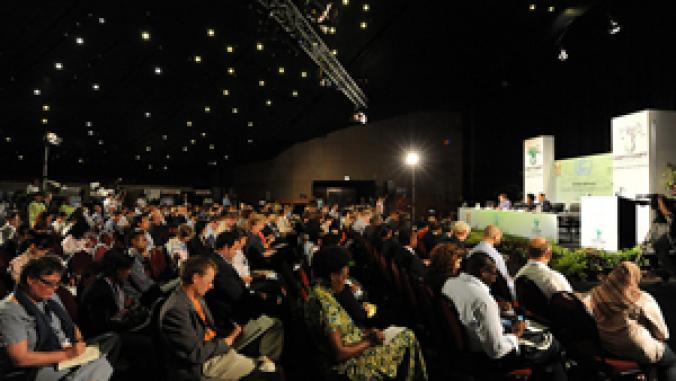Scenes from the World Climate Summit
<p>As a business-focused counterpoint to the COP16 summit in Cancun, more than 800 leaders from five continents joined in a weekend-long summit that featured a refreshingly positive tenor about our ability to address climate change.</p>

On December 4th and 5th, over 800 business, government, non-profit and NGO leaders from five continents gathered during the weekend intermission of the COP 16 climate talks. The first World Climate Summit is billed as "a global, collaborative 10 year platform to bring together leaders from industry, finance, science and government. The goal: to learn, share, strategize, and launch new initiatives to address climate change and build the global clean economy." GreenBiz.com's Heather King reviews the conference highlights -- Sir Richard Branson's mandate for business, Gigaton award winners such as Nike, 3M, and Ted Turner, and the relevance of WCS to the U.N.'s climate talks leader, Christiania Figueres.
The tenor of the first World Climate Summit (WCS) was positive -- a refreshing break from the diminishing optimism dampening the COP 16 talks. Richard Branson rallied business to take charge of advancing climate change solutions. "We can't wait for government [to figure this out]. We have to tackle climate change with business and financiers. Business has to lead the way."
Throughout the weekend, executives opted for business over beach. A diverse array of companies shared best practices and innovations, many of which have potential to transform entire industries. Hannah Jones, VP of Sustainable Business and Innovation at Nike, is now working with competitors to share intellectual property on improvements in packaging and other sustainability related advances, while not compromising Nike's ability to compete on the product front. Last year, Nike partnered with Best Buy and others to launch the Green Xchange to facilitate the sharing of green product research, designs and patents. Such intellectual property sharing has strong potential to accelerate sustainability advances across the retail industry and beyond.
Andreas Klugesheid, VP of Governmental Affairs at BMW, stated that "[embracing] sustainability is a clear management decision, not an accident." He added that BMW already has a large fleet of electric vehicles on the road. In the future, we can expect BMW to roll out carbon fiber cars, which are lighter weight and more fuel-efficient vehicles. BMW hopes to encourage its customers to buy into a transportation portfolio of BMW products integrated with public transportation use, such that they have access to the transportation means that best suits their need -- day by day. "In the future, we will be a mobility company, not a car company."
 WCS did not yield any binding agreements or blueprint going forward. However, there were several announcements that, although voluntary, have potential to advance various industries along the sustainability curve.
WCS did not yield any binding agreements or blueprint going forward. However, there were several announcements that, although voluntary, have potential to advance various industries along the sustainability curve.
The Carbon War Room launched the Gigaton Awards, the Oscars of low-carbon industry, where they recognized the outstanding accomplishments of companies such as Reckitt Benckiser, Nike, 3M, Vodafone, GDF Sues, and Suzlon. The purpose of these awards is to foster "the race to be greener" major industry sectors -- consumer staples, consumer discretionary, industrials, communications, utilities, and energy. The Carbon War Room also announced ShippingEfficiency.org, a universal energy index for the shipping industry. The program will use a public ranking system to motivate the industry to reduce its carbon intensity.
OPIC (Overseas Private Investment Corporation -- a U.S. government agency) announced that it will provide $300 million to new private equity investment funds. Ultimately, OPIC projects that these funds could grow to over $1 billion. These funds will be available for investment in renewable resources projects in emerging markets. This would be one of the largest initiatives by the U.S. Government to support the international effort to mitigate climate change.
Avoided Deforestation Partners announced a fully approved Voluntary Carbon Standard methodology for avoided deforestation that will enable immediate flow of capital to projects that reduce deforestation rates. Colin Turner of greenTEK ventures announced a $150 million Mexico Fund dedicated to climate change mitigation in the host country.
The Prince of Wales Leadership Group created the Cancun Communiqué in partnership with business leaders, and now more than 350 businesses have signed on to the document. The Communiqué follows on a similar document created during the COP15 talks, and provides a renewed call for politicians to deliver "an ambitious, robust and equitable global deal on climate change" at the Cancun climate talks.
The launch of the World Climate Initiative itself provided a business code of conduct for reductions of greenhouse gas emissions, integration of sustainability into core strategy, and leadership to drive change.
Unfortunately, U.S. participation in WCS -- from both the business and government side -- was conspicuously weak. European companies and international non-profits dominated the panels and attendance. This is likely related to the facts that Europe is further invested in sustainability and clean tech, and that this event was organized by a European based team. The forum highlighted that the U.S. continues to lag in commitment, investment, innovation and policy. It was clear that lagging U.S. investment and policy is becoming a barrier to global industry, and the anemic attendance at WCS was not well received. "We need the market signals [of a carbon reduction policy], especially from the U.S.," said Nike's Hannah Jones flatly.
David Sandalow, President Obama's Assistant Secretary for Policy & International Affairs, did attend the final panel. He agreed on the need for a price on carbon, pointed out that the U.S. has made advancements in certain regions, and referenced that we "need to keep marching forward on a number of complementary measures." Sandalow stressed the importance of efficiency as an easy building block, something we can tackle in the here and now.
Looking ahead, Aimee Christensen, Program Chair for WCS and CEO of Christensen Global Strategies, is optimistic about the impact of WCS. In her view, the event underscored "that business wants market signals to protect the environment" and that, "even without a global carbon market, business is acting, not waiting." Christensen added, "the net impact on the climate talks is also a plus. Business wants to partner with governments to get this done. We have the business case. We can concretely show how climate change policy will create quality jobs now."
As the weekend gathering came to a close and the COP 16 talks readied to resume, Christiania Figueres, the leader of the U.N. Climate talks, acknowledged the important role businesses must play in helping move negotiations and governments along. "Last year, in Copenhagen, we bought into unrealistic expectations," she admitted. "We are at a point that all countries need to be involved. This is a complex issue and we realize we need to move one step at a time and build a foundation that balances science with political reality. It is critical that business move our governments along."





